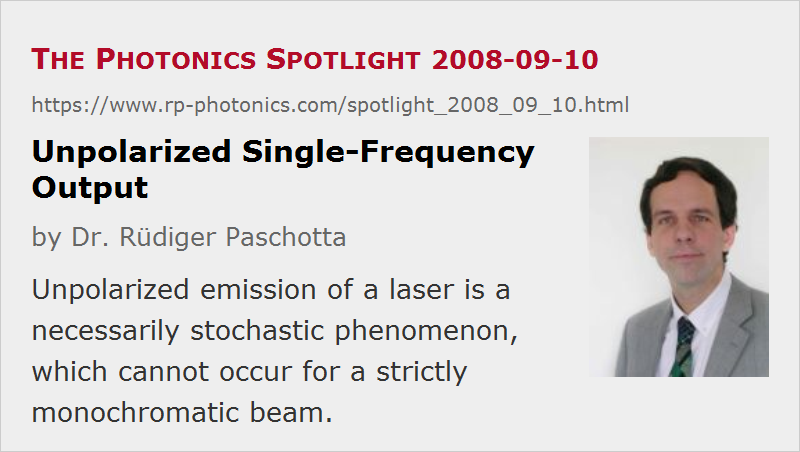Unpolarized Single-Frequency Output
Posted on 2008-09-10 as a part of the Photonics Spotlight (available as e-mail newsletter!)
Permanent link: https://www.rp-photonics.com/spotlight_2008_09_10.html
Author: Dr. Rüdiger Paschotta, RP Photonics Consulting GmbH
Abstract: Unpolarized emission of a laser is a necessarily stochastic phenomenon, which cannot occur for a strictly monochromatic beam.

Ref.: encyclopedia articles on polarization of light, single-frequency lasers
Did you ever encounter a single-frequency laser with truly unpolarized output? This question is a lot more tricky than it may seem. At least for strictly monochromatic emission, some defined polarization state is actually unavoidable, i.e., unpolarized emission is impossible. For any monochromatic laser beam propagation in z direction, the complex field amplitude Ex and Ey for oscillation in the two transverse directions must have some constant values, and depending on their magnitudes and phases, the polarization is either linear in some direction, or elliptical, or circular. Unpolarized emission is a necessarily stochastic phenomenon, which implies an optical spectrum which cannot be described with a delta function.
This article is a posting of the Photonics Spotlight, authored by Dr. Rüdiger Paschotta. You may link to this page and cite it, because its location is permanent. See also the RP Photonics Encyclopedia.
Note that you can also receive the articles in the form of a newsletter or with an RSS feed.
Questions and Comments from Users
Here you can submit questions and comments. As far as they get accepted by the author, they will appear above this paragraph together with the author’s answer. The author will decide on acceptance based on certain criteria. Essentially, the issue must be of sufficiently broad interest.
Please do not enter personal data here; we would otherwise delete it soon. (See also our privacy declaration.) If you wish to receive personal feedback or consultancy from the author, please contact him e.g. via e-mail.
By submitting the information, you give your consent to the potential publication of your inputs on our website according to our rules. (If you later retract your consent, we will delete those inputs.) As your inputs are first reviewed by the author, they may be published with some delay.
 |




If you like this page, please share the link with your friends and colleagues, e.g. via social media:
These sharing buttons are implemented in a privacy-friendly way!